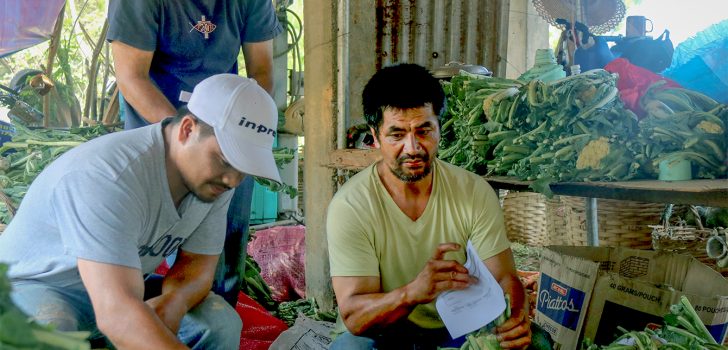 Members of EFIPA, Proponent Group of the Hog Raising and Kinnuday Making micro-enterprise subproject, haul and consolidate farm produce of farmers from barangay Eddet and other neighboring barangays to be marketed through the DA’s Kadiwa ni Ani at Kita Program (Photo by Mac James T. Dacillo, DA-CAR RAFIS)
Members of EFIPA, Proponent Group of the Hog Raising and Kinnuday Making micro-enterprise subproject, haul and consolidate farm produce of farmers from barangay Eddet and other neighboring barangays to be marketed through the DA’s Kadiwa ni Ani at Kita Program (Photo by Mac James T. Dacillo, DA-CAR RAFIS) Going big from raising pigs: EFIPA integrates vegetable marketing in their enterprise operation
Hog raising has been a profitable business for families in the Cordillera through the decades. It has been an additional source of income for farm families, next to vegetable production, especially in a far-off area like barangay Eddet in the municipality of Kabayan, Benguet.
With the growing competition in terms of vegetable supply and marketing, some farmers in barangay Eddet engaged in backyard hog raising to augment their daily needs.
The demand for pigs especially during times of social activities like weddings, burials, and other community/traditional festivities has urged the Eddet Farmers Indigenous People’s Association (EFIPA) to venture in hog raising and kinnuday (smoked meat) processing through a micro-enterprise proposal under the Department of Agriculture’s Philippine Rural Development Project (DA-PRDP).
With a project cost of one million funded by the World Bank with counterparts from the DA, the local government, and the proponent group, 175 piglets along with feeds and biologics were provided to EFIPA in two tranches. Four to five piglets were distributed to each of the members of the association and were sold per live weight or kilograms. Since then, the EFIPA has been rolling out their profits, one cycle after another while benefiting more of their members.
As of December 2019, the EFIPA has already gained a total net income of more than P885 thousand from their micro-enterprise on hog raising. To sustain their enterprise operation, the association has been collecting the total investment cost provided, including P200.00/pig as capital build-up and P5.00/head as service fee from each recipient.
Meanwhile, the outbreak of the African Swine Fever (ASF) virus in the last quarter of 2019 has challenged not only the large-scale hog raisers in Benguet province, but also the EFIPA as they were about to go into their third cycle.
As the association began to strategize how they can prevent ASF in their community while they continue with their micro-enterprise operations, community quarantine was enforced due to the COVID-19 (Coronavirus disease 2019) global pandemic.
Mobility and transport utilities have been limited which impeded not only the operation of EFIPA’s micro-enterprise, but has also greatly affected the marketing and delivery of vegetables produced by their members and the other farmers in barangay Eddet.
EFIPA did not see this as a threat to its enterprise but rather, saw an opening of a new opportunity.
Integrating vegetable consolidation and marketing
Agriculture is the most dominant sector which provides employment to majority of the local populace in Kabayan. With the occurring challenges due to the outbreak of the ASF virus and the COVID-19 pandemic, EFIPA integrated the consolidation and marketing of vegetables in their enterprise operations.
Using a chunk of the profits they gained from their hog raising micro-enterprise, EFIPA has initiated to consolidate the vegetables produced by their members and the other farmers in barangay Eddet to help them market their harvests in this time of pandemic.
Through the DA’s Kadiwa ni Ani at Kita program, the EFIPA was able to consolidate and sell a total of 10,000 kilograms of assorted highland vegetables such as chayote, carrots, cabbage, broccoli, and cauliflower among others. The association was able to generate a total net income of P285 thousand from the consolidation and marketing of vegetables.
According to Margie Felix, EFIPA President, the assistance provided by the DA in the delivery and marketing of their vegetable produce has greatly helped them earn more while they take a short pause from their hog raising micro-enterprise.
“While quarantine restrictions are still in place, we will continue to aid our members as well as the other farmers in our barangay to market their vegetable products through EFIPA with the help of the DA’s Kadiwa program,” she added.
With continuous cooperation, unity, and participation as a group, the EFIPA commits to enrich and sustain the enterprise and other assistance granted to them as they aim forward to becoming a cooperative.
“After all these challenges, we at the EFIPA intend to shift from association to cooperative to be able to provide more services to our members,” expressed Felix. ### ELVY S. TAQUIO (DA-PRDP CARPCO InfoACE)
